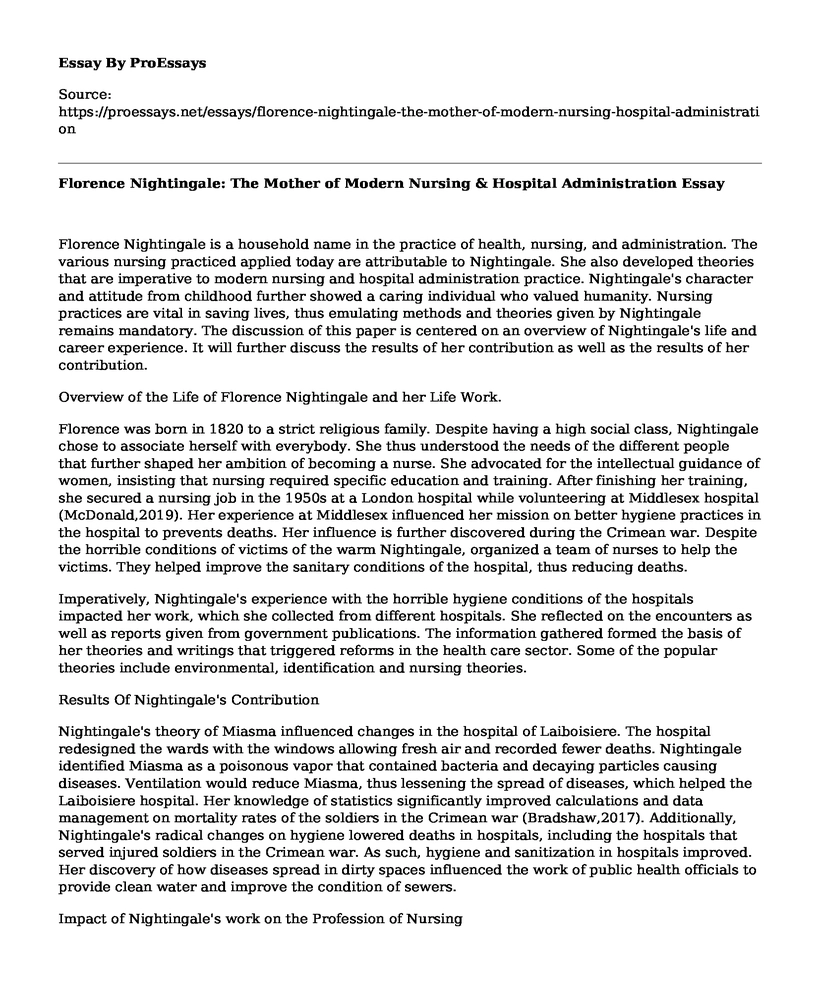Florence Nightingale is a household name in the practice of health, nursing, and administration. The various nursing practiced applied today are attributable to Nightingale. She also developed theories that are imperative to modern nursing and hospital administration practice. Nightingale's character and attitude from childhood further showed a caring individual who valued humanity. Nursing practices are vital in saving lives, thus emulating methods and theories given by Nightingale remains mandatory. The discussion of this paper is centered on an overview of Nightingale's life and career experience. It will further discuss the results of her contribution as well as the results of her contribution.
Overview of the Life of Florence Nightingale and her Life Work.
Florence was born in 1820 to a strict religious family. Despite having a high social class, Nightingale chose to associate herself with everybody. She thus understood the needs of the different people that further shaped her ambition of becoming a nurse. She advocated for the intellectual guidance of women, insisting that nursing required specific education and training. After finishing her training, she secured a nursing job in the 1950s at a London hospital while volunteering at Middlesex hospital (McDonald,2019). Her experience at Middlesex influenced her mission on better hygiene practices in the hospital to prevents deaths. Her influence is further discovered during the Crimean war. Despite the horrible conditions of victims of the warm Nightingale, organized a team of nurses to help the victims. They helped improve the sanitary conditions of the hospital, thus reducing deaths.
Imperatively, Nightingale's experience with the horrible hygiene conditions of the hospitals impacted her work, which she collected from different hospitals. She reflected on the encounters as well as reports given from government publications. The information gathered formed the basis of her theories and writings that triggered reforms in the health care sector. Some of the popular theories include environmental, identification and nursing theories.
Results Of Nightingale's Contribution
Nightingale's theory of Miasma influenced changes in the hospital of Laiboisiere. The hospital redesigned the wards with the windows allowing fresh air and recorded fewer deaths. Nightingale identified Miasma as a poisonous vapor that contained bacteria and decaying particles causing diseases. Ventilation would reduce Miasma, thus lessening the spread of diseases, which helped the Laiboisiere hospital. Her knowledge of statistics significantly improved calculations and data management on mortality rates of the soldiers in the Crimean war (Bradshaw,2017). Additionally, Nightingale's radical changes on hygiene lowered deaths in hospitals, including the hospitals that served injured soldiers in the Crimean war. As such, hygiene and sanitization in hospitals improved. Her discovery of how diseases spread in dirty spaces influenced the work of public health officials to provide clean water and improve the condition of sewers.
Impact of Nightingale's work on the Profession of Nursing
Nightingale influences nursing practice as she highlighted the responsibility of nurses to patients. Nurses were tasked with ensuring that the patient remained in the best condition where nature would then act on them. Also, nurses had the responsibility of giving a conducive environment to patients by reducing noise, excess light, or anxiety for patients to rest. Furthermore, Nightingale educated the masses on the profession of nursing as being impacted by environmental adaptation.
Generally, an overview of Nightingale's life and work influenced practices in nursing and hospital care of patients. Her theories resulted in changes that were adopted by major hospitals and are presently applied. She also influenced better hygiene and water supplies in hospitals. Her profession revolutionized nursing practices to focus on patient needs and environmental adaptation. Nightingale's work should be remembered and continually applied in healthcare practice.
References:
BIBLIOGRAPHY \l 1033 Bradshaw, N. A. (2017). Florence Nightingale (1820-1910): A Pioneer of Data Visualisation. Women in Mathematics, 1, 197-217. Retrieved from https://link.springer.com/chapter/10.1007/978-3-319-66694-5_11McDonald, L. (2019). Florence Nightingale: A Reference Guide to Her Life and Works. Lanham, Maryland: Rowman & Littlefield Publishers. Retrieved from https://books.google.co.ke/books?id=XGW1DwAAQBAJ&printsec=frontcover&dq=Overview+of++the+Life+of+Florence+Nightingale+and+her+Life+Work.&hl=en&sa=X&ved=0ahUKEwiOqfG7ttnoAhURrHEKHU56CbsQ6AEINjAC#v=onepage&q=Overview%20of%20%20the%20Life%20of%20Florence%20NSayani, A. H. (2017). Nightingale's Theory and its Application to Pediatric Nursing Care. i-Manager's Journal on Nursing, 7(2), 38-42. doi:10.26634/jnur.7.2.13696
BIBLIOGRAPHY \l 1033
Cite this page
Florence Nightingale: The Mother of Modern Nursing & Hospital Administration. (2023, May 15). Retrieved from https://proessays.net/essays/florence-nightingale-the-mother-of-modern-nursing-hospital-administration
If you are the original author of this essay and no longer wish to have it published on the ProEssays website, please click below to request its removal:
- The Five Theories of Ethics Essay Example
- Essay Example on Same-Sex Marriage: A Historical Perspective
- Nutrition for Health: Balanced Diet for Optimal Wellbeing - Essay Sample
- Paper Example on Early Modern Philosophers: Descartes & Leibniz
- CIOs: Be Familiar With 4 Unethical AI Issues - Essay Sample
- 96% of Air Crashes in 2014: The Unsatisfactory Reality - Essay Sample
- Metaphysical Journey in Iraq - Movie Review Example







